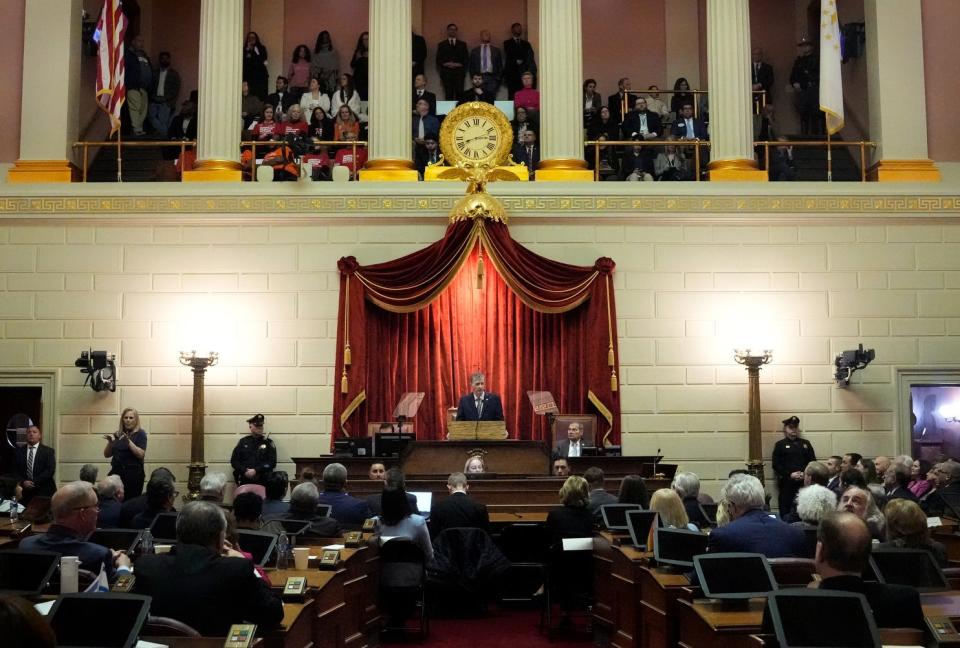Progressive lawmakers release their priorities: Higher taxes for top earners, free student lunch
- Oops!Something went wrong.Please try again later.
PROVIDENCE – In a move as familiar as snow in winter and robins in spring, Rhode Island's progressive lawmakers have renewed the call to raise taxes on the rich with the goal of raising upwards of $100 million for their many priorities, including free breakfasts and lunches for all students - and the preservation of RIPTA.
They renewed the call on Tuesday at a State House news conference, hosted by the Working Families Party, that focused in part on Rep. Karen Alzate's bill to impose a 3% surchange on personal taxable income above $1 million.
What would the higher taxes pay for?
Alzate's expectation: The surtax would raise $126 million that her bill would earmark for:
Affordable, reliable and high-quality child care and early-learning programs
High-quality public education
Affordable public colleges and universities
Repair and maintenance of roads and bridges
Public transportation
Calling her proposal "a matter of social justice"," Alzate said a higher tax on millionaires would "redistribute wealth and bridge the growing gap between the rich and the rest of our society, especially our most vulnerable islanders."
The two dozen or so House members at Tuesday press conference also want to "expand paid family leave," "lower the cost of prescription drugs" by legalizing the import of medications from Canada and guarantee renters facing eviction have legal help.

Other progressive priorities: RIPTA funding, free school lunches
Not all require additional state dollars.
But some do, including a financial bailout of some sort for RIPTA, the state's financially struggling public transit system, which is contemplating service cuts because of a driver shortage while also facing a "fiscal cliff."
Calling Gov. Dan McKee's $10 million boost for RIPTA woefully inadequate, Rep. David Morales, D-Providence said: "It is clear that our public transportation system is on the brink of a collapse. It is on the verge of being severely, severely underfunded.
"The governor's recent state budget proposal ... directly threatens the needs of working people, families, students, and seniors. It threatens their ability to be able to access the grocery store, the laundromat, the doctor's office, their job, their school site."
Another big-ticket proposal would create a $50-million revolving fund to finance the construction of mixed-income public housing by a public developer – a new state agency.
"Let’s imagine building a 100-unit apartment building and restricting access ... to households in poverty," said Rep. June Speakman, D-Warren, in a statement ahead of the news conference. "Rents will never meet the costs to keep the property afloat."
"But if you set aside, say, a third of the homes for people below the poverty line, a third for people near the area’s median income and a third for people above it, you can break even – or even come out on top, bringing in funds to help finance affordable units," she said.
On the push to provide free lunches to all students, regardless of family income, Rep. Justine Caldwell, D-East Greenwich, said: "Working families need help in their day-to-day lives. They don't need an archive. They don't need a new courthouse. They don't need a new $15 million one year. [fad] to bolster test scores."
"Hungry students cannot learn no matter what [the] curriculum," she said.
Gov. Dan McKee's proposed new state budget does not go that far, but it would turn reduced-price lunches into free lunches for about 6,500 students from low-income families. Not enough said the legislators.
Do these proposals have any chance of passing?
In interviews ahead of this year's legislative session, legislative leaders had no interest in broadly raising taxes on any segment of the state's population. McKee's proposed new state budget also made no moves in that direction.
Alzate, D-Pawtucket, went into Tuesday's news conference with this argument: "It’s time we fund the services our communities want and need: stronger schools, child care we can all afford, a better public transit system and so much more."
"The people who have gotten the richest can pay a little more to make the state that helped them get there stronger," she continued.
This year's proposal is aimed at wealthier Rhode Islanders more than attempts in previous years were.
A 2019 proposal by a band of progressive candidates running under the Rhode Island Political Cooperative banner would have raised the top marginal tax rate from 5.99% to 10.99% for individuals making more than $467,700 a year.
Like its predecessors, the idea never took hold.
To:Gregg, Katherine
Wed 1/31/2024 1:58 PM
The year-after-year fight centers on the premise that the highest-income Rhode Islanders pay a smaller percentage of their income in state and local sales, income, and property taxes than those with the lowest income.
According to a recent report from the "Institute on Taxation and Economic Policy" which using 2023 data, concluded: the top 1% in income in Rhode Island pay 8.6% of their income in state and local taxes, while the lowest 20% in income pay 13.3%.
This article originally appeared on The Providence Journal: Free school lunches, taxing the rich: RI progressives share priorities

